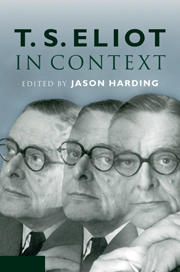Book contents
- Frontmatter
- Contents
- List of illustrations
- List of contributors
- Acknowledgements
- List of abbreviations
- Introduction
- PART ONE LIFE
- PART TWO FORMS
- PART THREE LITERARY CROSS-CURRENTS
- PART FOUR POLITICS, SOCIETY AND CULTURE
- 26 Politics
- 27 Economics
- 28 Anti-Semitism
- 29 Gender
- 30 Religion
- 31 Philosophy
- 32 Social science
- 33 Natural science
- PART FIVE RECEPTION
- Further reading
- Index
30 - Religion
Published online by Cambridge University Press: 05 August 2012
- Frontmatter
- Contents
- List of illustrations
- List of contributors
- Acknowledgements
- List of abbreviations
- Introduction
- PART ONE LIFE
- PART TWO FORMS
- PART THREE LITERARY CROSS-CURRENTS
- PART FOUR POLITICS, SOCIETY AND CULTURE
- 26 Politics
- 27 Economics
- 28 Anti-Semitism
- 29 Gender
- 30 Religion
- 31 Philosophy
- 32 Social science
- 33 Natural science
- PART FIVE RECEPTION
- Further reading
- Index
Summary
T. S. Eliot's declaration of his Anglo-Catholicism was made in the preface to For Lancelot Andrewes (1928): ‘my present position … may be described as classicist in literature, royalist in politics, and anglo-catholic in religion’ (FLA, ix). It is commonplace to refer to the poet's ‘conversion’ to Anglo-Catholicism, which is useful for marking his formal commitment of 1927 when he received, in private, the Christian sacraments of baptism and confirmation (on 29 and 30 June, respectively). And Eliot occasionally uses the word himself, of his own experience and more generally: ‘scepticism’, he wrote in 1932, ‘is the preface to conversion’. But he also noted: ‘No one ever attempted to convert me; and, looking back on my pre-Christian state of mind, I do not think that such a campaign would have prospered.’ Where ‘conversion’ is misleading, with regard to Eliot's faith, is in its suggestion of those instantaneous events, as a result of which converts are changed utterly and a breach is made with their previous, unregenerate lives. They are ‘born again’. This is where Anglo-Catholic tradition and Eliot's own spiritual experience part company from Protestant, evangelical ideas of conversion, about which (especially the emotional element, which can play a powerful role) he was deeply suspicious. Accordingly, even when Eliot had become the best known of Anglo-Catholic writers, he was at pains to point out that, as no one ever attempted to convert him, so, in his Christian writings, he was not ‘attempting to convert’ (ICS, 21) his readers.
- Type
- Chapter
- Information
- T. S. Eliot in Context , pp. 305 - 315Publisher: Cambridge University PressPrint publication year: 2011
- 1
- Cited by



